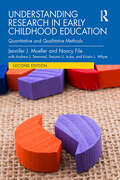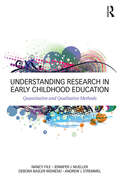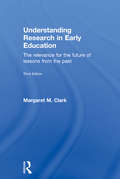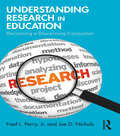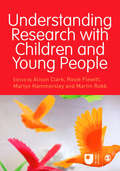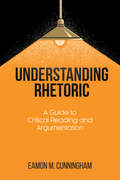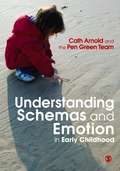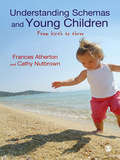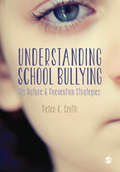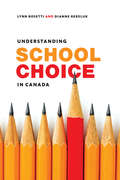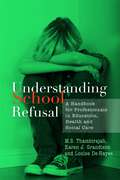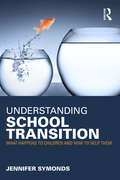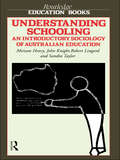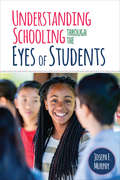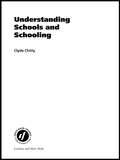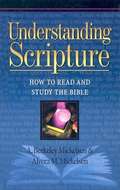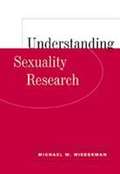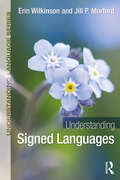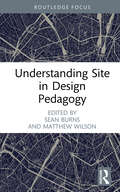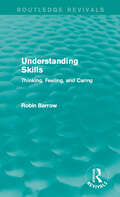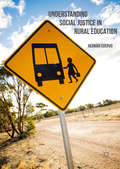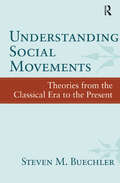- Table View
- List View
Understanding Research in Early Childhood Education: Quantitative and Qualitative Methods
by Jennifer J. Mueller Nancy File Andrew J. Stremmel Iheoma U. Iruka Kristin L. WhyteThis second edition invites readers to be informed consumers of both quantitative and qualitative methods in early childhood research. It offers side-by-side coverage and comparison about the assumptions, questions, purposes, and methods for each, presenting unique perspectives for understanding young children and early care and education programs. The new edition includes updated examples and references as well as a new chapter on equity issues in research. By using this book, students will be able to read, evaluate, and use empirical literature more knowledgeably. These skills are becoming more important as early childhood educators are increasingly expected to use evidence-based research in practice and to participate in collecting and analyzing data to inform their teaching.
Understanding Research in Early Childhood Education: Quantitative and Qualitative Methods
by Andrew J. Stremmel Debora Basler Wisneski Jennifer J. Mueller Nancy FileUnderstanding Research in Early Childhood Education: Quantitative and Qualitative Methods prepares readers to be informed consumers of early childhood research. Rather than following the traditional format of covering quantitative and qualitative methods separately, this innovative textbook offers side-by-side coverage and comparison about the assumptions, questions, purposes and methods for each, offering unique perspectives for understanding young children and early care and education programs. Understanding Research in Early Childhood Education is broadly based across the major research paradigms, and numerous examples are offered throughout the text. Through the use of this book, students will be able to more knowledgeably read, evaluate, and use empirical literature. These skills are becoming more important as early childhood educators are increasingly expected to use evidence-based research in practice and to participate in collecting and analyzing data to inform their teaching.
Understanding Research in Early Education: The relevance for the future of lessons from the past
by Margaret M. ClarkIn this newly revised edition of Understanding Research in Early Education, Margaret Clark demonstrates the continuing relevance of research in the homes of young children and in preschool units. Through rigorous yet understandable language, the text stresses the importance of research, acknowledging how easy it can be, amidst the change and flood of documents on early education and care, to overlook the insights to be gained from past research. The author draws on her own studies, and those of others, to illustrate how to avoid common pitfalls, ask the right questions to inform students’ research projects, and critically apply findings in the classroom or nursery. The book is one of the few texts for students to bring research alive, analysing key research to consider its limitations and the extent to which results are relevant to policy and practice. Without requiring any prior expertise in research and research methodologies, the third edition will prove invaluable for undergraduate and postgraduate students taking courses in early years’ education, and practitioners undertaking continuing professional development. New content includes: fully revised chapters, an updated reference list, and a new chapter discussing current research on baseline assessment.
Understanding Research in Education: Becoming a Discerning Consumer
by Fred Perry Jr. Joe NicholsThis text provides a solid introduction to the foundations of research methods, with the goal of enabling students and professionals in the various fields of education to not simply become casual consumers of research who passively read bits and pieces of research articles, but discerning consumers able to effectively use published research for practical purposes in educational settings. All issues important for understanding and using published research for these purposes are covered. Key principles are illustrated with research studies published in refereed journals across a wide spectrum of education. Exercises distributed throughout the text encourage readers to engage interactively with what they are reading at the point when the information is fresh in their minds. This text is designed for higher level undergraduate and graduate programs. Course instructors will find that it provides a solid framework in which to promote student interaction and discussion on important issues in research methodology.
Understanding Research with Children and Young People (Published in association with The Open University)
by Martyn Hammersley Dr Martin Robb Rosie Flewitt Alison ClarkHow do views about children shape research concerned with their lives? What different forms can research with children take? What ethical issues does it involve? How does it impact on policy and practice, and on the lives of children themselves? This book helps you to understand how research is designed and carried out to explore questions about the lives of children and young people. It tackles the methodological, practical and ethical challenges involved, and features examples of actual research that illustrate: Different strategies for carrying out research Common challenges that arise in the research process Varying modes of engagement that researchers can adopt with participants and audiences; and The impact that research can have on future studies, policy and practice.
Understanding Rhetoric: A Guide to Critical Reading and Argumentation
by Eamon M. CunninghamUnderstanding Rhetoric: A Guide to Critical Reading and Argumentation is a composition textbook that outlines three essential skills – rhetoric, argument, and source-based writing – geared towards newcomers and advanced students alike. Though comprehensive in its coverage, the book’s focus is a simple one: how to move beyond a 'gut reaction' while reading to an articulation of what is effective and what is not, while explicitly answering the most important question of 'Why?' This text gets at this central concern in two fundamental ways.First, the text teaches composition as a cumulative process, coaching you how to question, challenge, and expand on not just the readings you hold in your hands, but also how to interrogate the internal processes of writing and thinking. The book's blend of composition methods detail the cross-point of product and process to turn reading and writing from a matter of coming up with answers to questions to learning what type of questions need to be asked in the first place. The 'right' questions, the text argues, are fundamentally rhetorical in nature.Second, the content of the practice-based chapters is framed into a larger mesh of intellectual history to show how the writing and thinking you are doing today is continuous with a long history of writing instruction that goes back to the ancient world. This book provides equal representation from classical and contemporary theory with the recognition that theory cannot be fully grasped without practice, and practice cannot be fully understood without its theoretical antecedent. After all, you can’t write 'outside the box' until you know where the box is and what it looks like.REVIEWS and WORDS OF PRAISE'Understanding Rhetoric is a timely resource. The challenge for good, careful writing and logical speaking and argumentation remains a task for postmodern education. This historically and philosophically grounded work is well written and presented in a way that is most helpful to both student and teacher alike. Understanding Rhetoric deserves a place in every high school and college classroom and resource library.'James B. Flynn, Ph.D., is a philosopher of education at Framingham State University in Massachusetts.'Spanning centuries of writing from classical philosophers to modern US Presidents, the text systematically addresses analysis and composition using both the technical, formal terms of writing as well as colloquialisms.… The text not only explains the process of analysis and writing, it provides detailed and varied examples of both. User-friendly, this text could readily be adopted and used for both college and high school-level composition courses; the teacher need only to begin on page one and the course curriculum would be complete.'Susanne Bronstein is the English Department Chair at Ashland High School in Massachusetts'Understanding the importance and power of language is more relevant than ever. Cunningham's book -- part informational text, part historical narrative, part handbook--is a critical guide for all students of rhetoric. Each chapter builds on those which precede it, encouraging readers to break away from formulaic processes to really understand, respond to, and control language in the process. The skills in this book are not important just in English classes but in all disciplines.'Erin Timlin is an AP English Language & Composition teacher at Marshfield High School in Massachusetts'Cunningham provides teachers and their students with tools to discern the deepest levels of meaning situated within the domain of authorial intent through technique, style, and argument. This approach, grounded in theory, structured in application, re-asserts the why of critical reading and writing as processes instead of mere products.'Tom O'Toole, Ed.D, is the Director of Humanities at Essex North Shore Agricultural and Technical High School in Massachusetts'Understanding Rhetoric is a helpful resource for any instructor of composition and will serve as an excellent textbook for college-level writing courses. In clear, student-friendly c
Understanding Schemas and Emotion in Early Childhood
by Cath ArnoldThis book makes explicit connections between young children's spontaneous repeated actions, and their representations of their emotional worlds. Drawing on the literature on schemas, attachment theory and family contexts, the author takes schema theory into the territory of the emotions, making it relevant to the social and emotional development strand in early childhood education. Based on research carried out alongside children, parents, workers and co-researchers at the world-famous Pen Green Nursery, and using case studies of a small number of individual children, the author shows new links between cognition and affect. The book includes a brief summary of a method of Child Study, using video and reflections on video sequences. This book will be of interest to students and practitioners on Early Childhood undergraduate and postgraduate courses, as well as those taking modules on schema theory.
Understanding Schemas and Young Children: From Birth to Three
by Cathy Nutbrown Frances AthertonShortlisted for the 2013 Nursery World Awards! 'This exciting book will greatly enhance understanding of learning throughout the early years, and reinforces the importance of responsive professionals who understand children's schemas. Atherton and Nutbrown have brought together socio-cultural and cognitive learning theories with ease, and their metaphors are brilliantly evocative' -Dr Anne Meade, Consultant 'This book is drawn from a study carried out with rigour and contains several gems, such as the 'bike and slide exploration'; the idea of adults engaging in 'a dialogue of conceptual correspondence' with children; and tables outlining 'what the children might have been thinking'. A great read!' -Dr Cath Arnold, Pen Green Early Years Centre 'This is an exciting and illuminating account of babies and toddlers, following their schema fascinations with determination and competence, as they continually explore and experiment and come to know their world. This book captivated me. It should be in every early childhood education setting' -Pam Cubey This is the first book to focus specifically on Schemas and children under three. The authors trace the development of schemas from motor level through to symbolic representation, and show how to use schema theory to understand young children's learning and behaviour. This accessible and student-friendly book includes: -activities and discussion points -links to policy and practice -descriptive observational material -a look at the ethics of this kind of research -numerous photographs and illustrations -suggestions for follow-up reading The book is aimed at early childhood professionals and practitioners in ECEC settings, as well as those on initial training courses, teacher education, Early Years courses, and higher degrees.
Understanding School Bullying: Its Nature and Prevention Strategies
by Peter K Smith'This extraordinarily comprehensive book authored by the leading international authority in the field integrates research, theory and practice on the topic of school bullying. In an already research saturated field Peter Smith’s writing captures the humanity of why this topic strikes such a chord in the community. He reminds us in a thoughtful, practical and caring manner why we must continue to advocate on all levels for those impacted by bullying.' -Professor Phillip T. Slee, Flinders University, Australia 'Understanding School Bullying offers a refreshingly clear account of the wealth of insights gained over a quarter of a century of research. As Smith’s comprehensive review convincingly shows, much has been learned and much of this has been put to good use in improving children’s wellbeing. This is surely essential reading for any researcher concerned with bullying, childhood or life at school.' -Sonia Livingstone, London School of Economics and Political Science, UK, author of Children, Risk and Safety Online 'Peter Smith’s new book will occupy a prominent place on my bookshelf. It provides a thorough and highly readable discussion of the breadth of research on school bullying. Dr. Smith includes discussions of important challenges related to research on this topic along with an excellent review of important studies and findings. This unique volume has influenced my thinking about the direction of my own research. The book will be an invaluable resource for researchers, consumers of research, and others who seek a research-based understanding of this important topic.' -Sheri Bauman, Ph.D., Professor at University of Arizona Bullying involves the repeated abuse of power in relationships. Bullying in schools can blight the lives of victims and damage the climate of the school. Over the last 25 years a burgeoning research program on school bullying has led to new insights into effective ways of dealing with it, as well as new challenges such as the advent of cyberbullying. This new book, by a leading international expert on the topic, brings together the cumulative knowledge acquired and the latest research findings in the area, with a global perspective especially covering research in Europe, North America, Australasia, and Asia. It will appeal to those taking academic courses in psychology, social work, educational psychology, child clinical psychology and psychiatry, and teacher training, but it will also be of interest to parents and teachers.
Understanding School Bullying: Its Nature and Prevention Strategies
by Peter K Smith'This extraordinarily comprehensive book authored by the leading international authority in the field integrates research, theory and practice on the topic of school bullying. In an already research saturated field Peter Smith's writing captures the humanity of why this topic strikes such a chord in the community. He reminds us in a thoughtful, practical and caring manner why we must continue to advocate on all levels for those impacted by bullying.' -Professor Phillip T. Slee, Flinders University, Australia 'Understanding School Bullying offers a refreshingly clear account of the wealth of insights gained over a quarter of a century of research. As Smith's comprehensive review convincingly shows, much has been learned and much of this has been put to good use in improving children's wellbeing. This is surely essential reading for any researcher concerned with bullying, childhood or life at school.' -Sonia Livingstone, London School of Economics and Political Science, UK, author of Children, Risk and Safety Online 'Peter Smith's new book will occupy a prominent place on my bookshelf. It provides a thorough and highly readable discussion of the breadth of research on school bullying. Dr. Smith includes discussions of important challenges related to research on this topic along with an excellent review of important studies and findings. This unique volume has influenced my thinking about the direction of my own research. The book will be an invaluable resource for researchers, consumers of research, and others who seek a research-based understanding of this important topic.' -Sheri Bauman, Ph.D., Professor at University of Arizona Bullying involves the repeated abuse of power in relationships. Bullying in schools can blight the lives of victims and damage the climate of the school. Over the last 25 years a burgeoning research program on school bullying has led to new insights into effective ways of dealing with it, as well as new challenges such as the advent of cyberbullying. This new book, by a leading international expert on the topic, brings together the cumulative knowledge acquired and the latest research findings in the area, with a global perspective especially covering research in Europe, North America, Australasia, and Asia. It will appeal to those taking academic courses in psychology, social work, educational psychology, child clinical psychology and psychiatry, and teacher training, but it will also be of interest to parents and teachers.
Understanding School Choice in Canada
by Dianne Gereluk Lynn BosettiUnderstanding School Choice in Canada provides a nuanced and theoretical overview of the formation and rise of school choice policies in Canada. Drawing on twenty years of work, Lynn Bosetti and Dianne Gereluk analyze the philosophical, historical, political, and social principles that underpin the formation and implementation of school choice policies in the provinces and territories. Bosetti and Gereluk offer theoretical frameworks for considering the parameters of school choice policies that are aligned and attentive to Canadian educational contexts. This robust overview successfully shifts the debate away from ideology in order to facilitate an understanding that the spectrum of school choice policy in Canada is a response to the varying political challenges in society at large. This book is essential reading for those who desire a deeper understanding of school choice policies in Canada.
Understanding School Refusal: A Handbook for Professionals in Education, Health and Social Care
by Louise De-Hayes Karen J. Grandison M. S. Thambirajah` Combining educational and clinical perspectives, and with extensive use of case studies, the authors present recent research into the mental health problems associated with school refusal, such as anxiety and panic attacks, as well as the role that parental support plays in their children's school life. They also discuss the role of home tuition services and pupil referral units in extreme cases of school refusal, and provides concrete strategies for planning and organising services to manage the problem effectively. Understanding School Refusal is a valuable guide for professionals across the disciplines of education, health and social care, and will also be useful for training courses within these fields.' Education Today School refusal is a crippling condition in which children experience extreme anxiety or panic attacks when faced with everyday school life and this handbook aims to explore and raise awareness of the problem of school refusal in children and young people, and provide plans and strategies for education, health and social care professionals for identifying and addressing this problem. Combining educational and clinical perspectives, and with extensive use of case studies, the authors present recent research into the mental health problems associated with school refusal, such as anxiety and panic attacks, as well as the role that parental support plays in their children's school life. They also discuss the role of home tuition services and pupil referral units in extreme cases of school refusal, and provides concrete strategies for planning and organising services to manage the problem effectively. Understanding School Refusal is a valuable guide for professionals across the disciplines of education, health and social care, and will also be useful for training courses within these fields.
Understanding School Transition: What happens to children and how to help them
by Jennifer SymondsSchool transition is a life changing event for children - they are rarely faced with such a powerful set of personal and social changes. These underpin the immediate and longer term wellbeing of children, peer groups, teachers and schools. Understanding School Transition provides a most comprehensive, international review of this important area, complete with practical advice on what practitioners can do to support children’s wellbeing, motivation and achievement. Offering an accessible introduction to children’s psychology at transition, Understanding School Transition explores transition as a status passage, what we really mean by wellbeing, and the ways in which children adapt to new environments. Key chapters focus on: ? Understanding stress and anxiety Children’s hopes, fears and myths at transition Parents’ and teachers’ influence and role Children’s relationships with peers as they change schools Children’s personal and collective identities Motivation, engagement and achievement Supporting the most vulnerable children ? Crucially, it advises how you can help children through implementing transition interventions and evaluating their success in your own school. Illustrated by case studies of experiences in real schools, Understanding School Transition will be essential reading for all training and practising teachers, as well as transition and subject specialists, who want to better understand and influence what happens to children at this critical stage.
Understanding Schooling: An Introductory Sociology of Australian Education
by Miriam Henry John Knight Robert Lingard Sandra TaylorFirst published in 1990. Routledge is an imprint of Taylor & Francis, an informa company.
Understanding Schooling Through the Eyes of Students
by Joseph F. MurphyPeer through the eyes of students. See school their way. When we act on what students show us, valued outcomes follow. Students know what engages and bores them and can offer dynamic insight into how to pique their best. When we know how to listen, we can increase interest, motivation, and achievement. This book shows readers how to tap into this student insight and adjust thinking to see learning through their eyes. Experience new levels of engagement and growth as you learn to: Build a culture of support, safety, and membership through academic excellence Nurture the growth of engaged teaching
Understanding Schooling Through the Eyes of Students
by Joseph F. MurphyPeer through the eyes of students. See school their way. When we act on what students show us, valued outcomes follow. Students know what engages and bores them and can offer dynamic insight into how to pique their best. When we know how to listen, we can increase interest, motivation, and achievement. This book shows readers how to tap into this student insight and adjust thinking to see learning through their eyes. Experience new levels of engagement and growth as you learn to: Build a culture of support, safety, and membership through academic excellence Nurture the growth of engaged teaching
Understanding Schools and Schooling
by Clyde ChittyUnderstanding Schools and Schooling provides students with the knowledge about school policy and process that they need in order to address and respond to current trends and discourses in critical, well-informed ways that will enhance their teaching and job satisfaction.The book presents issues, questions and dilemmas and invites the reader to find their own answers through guided activities, discussion with colleagues and further reading. The book provides a philosophical context for teachers' developing classroom practice and empowers them to participate fully in local and national debate about the nature, purposes and future of compulsory education in the UK and elsewhere.
Understanding Scripture: How To Read and Study the Bible
by A. Berkeley Mickelsen Alvera M. MickelsenWithout question, studying the Bible can be one of the most rewarding experiences of the Christian life. Unfortunately, if you are ill-equipped, studying the Bible can also be intensely frustrating. For example, how do we know when the Bible is being literal and when it's being figurative-and how can we tell the difference without a degree in theology? What do history and culture have to do with studying the Bible? Are there principles for interpreting parables, allegories, prophecies? Is Revelation different? Because questions like these are inescapable, Understanding Scripture: How to read and Study the Bible is a must for the individual interested in maximizing his or her time in Bible study. This book arose out of Alvera and Berkeley Mickelsen's life-long passion for helping people understand the Bible and its significance for their lives. Now in a thorough revision of the 1978 edition co-authored with her husband, Alvera Mickelsen once again shows how principles of interpreting God's word can make Scripture come alive in an unprecedented way.
Understanding The Scriptures (Semester Edition)
by Scott HahnPart of the Didache series. Presenting a Catholic approach to Scripture and highlighting the theme of covenant, Understanding the Scriptures: Semester Edition will provide an understanding of Sacred Scripture so critical to the Catholic Faith.
Understanding Sexuality Research
by Michael W. WiedermanWiederman (Columbia College) explains how to apply critical thinking skills to human sexuality research in order to become a more critical judge of research conducted by others. His first chapters explore the goals of the research, the participants, how questions are posed, what the results mean, and whether conclusions match the research design. Then he details ten case studies. He does not include an index. Annotation c. Book News, Inc., Portland, OR (book news. com)
Understanding Signed Languages (Understanding Language)
by Erin Wilkinson Jill P. MorfordUnderstanding Signed Languages provides a broad and accessible introduction to the science of language, with evidence drawn from signed languages around the world. Readers will learn about language through a unique set of signed language studies that will surprise them with the diversity of ways human languages achieve the same functional goals of communication. Designed for students with no prior knowledge of signed languages or linguistics, this book features: A comprehensive introduction to the sub-fields of linguistics, including sociolinguistics, linguistic structure, language change, language acquisition, and bilingualism; Examples from more than 50 of the world’s signed languages and a brief “Language in Community” snapshot in each chapter highlighting one signed language and the researchers who are documenting it; Opportunities to reflect on how language ideologies have shaped scientific inquiry and contributed to linguistic bias; Review and discussion questions, useful websites, and pointers to additional readings and resources at the end of each chapter. Understanding Signed Languages provides instructors with a primary or secondary text to enliven the discourse in introductory classes in linguistics, interpreting, deaf education, disability studies, cognitive science, human diversity, and communication sciences and disorders. Students will develop an appreciation for the language-specific and universal characteristics of signed languages and the global communities in which they emerge.
Understanding Site in Design Pedagogy (Routledge Focus on Design Pedagogy)
by Sean Burns Matthew WilsonThis book examines diverse ways of questioning, critiquing, and communicating site in the creative process of architecture, interior design, urban planning, and historical and cultural studies. The authors use the term site to connote a series of complex, established, or pre-existing conditions – a setting, an atmosphere, an area – to read, to interpret, to relate to, and to engage with, to redefine, or to create in relation to a design prompt. By acknowledging, accommodating, and empowering the physical, intellectual, and cultural characteristics of a site, students question its history, boundaries, posture, and situational aspects. Such inquiries promote a deeper appreciation of a site and thus help students to acknowledge its capacity to influence design throughout the iterative creative process. Understanding Site in Design Pedagogy adds to the body of literature on design studio pedagogy by presenting a collection of essays that challenge normative assumptions about what defines a site and its distinctive qualities. It poses a series of pedagogical questions for how sites might be diversely interpreted and introduced to design students. This study offers chapters that speak to site, memory, and lived experience; multi-scalar thinking about site; connecting to site through sensory phenomenon in interior design; alternate ways of engaging site for learning sustainable principles; and introducing unorthodox forms of site as the impetus to creative endeavours. It offers innovative approaches to scholarship of teaching and learning with respect to diverse readings of site within design education.
Understanding Skills: Thinking, Feeling, and Caring (Routledge Revivals)
by Robin BarrowIt is widely agreed that education should involve the development of understanding, critical thinking, imagination, and emotions. However, this book, first published in 1990, argues that our views to these key concepts are confused and inaccurate, and therefore what we do in schools is generally inappropriate to our ideal. This book will be of interest to students of education and philosophy.
Understanding Social Justice in Rural Education
by Hernán CuervoThis book explores what social justice looks like for rural schools in Australia. The author challenges the consensus that sees the distribution of resources as the panacea for the myriad challenges faced by rural schools and argues that the solution to inequality and injustice in rural settings has to take into account other important dimensions of social justice such as recognition and association. These include teachers' concerns for issues of power, respect, and participation in their work that extend to policy-making processes and implementation; students' post-school aspirations and, finally, parents' hopes and fears for their children's futures and the sustainability of their community. The book brings together political and social theory with education and youth studies, provides new insights about the complex nature of schooling in rural places, and makes a strong connection between schooling and the people and communities it serves.
Understanding Social Movements: Theories from the Classical Era to the Present
by Steven M. BuechlerIn thirteen succinct chapters, Buechler traces movement theories from the classical era of sociology to the most recent examples of transnational activism. He identifies the socio-historical context, central concepts, and guiding logic of diverse movement theories, with emphasis on: Comparisons of Marx and Lenin; Weber and Michels; and Durkheim and LeBon The Chicago School of the inter-war period The political-sociological approaches of the 1950s The varieties of strain and breakdown theories at the dawn of the 1960s Major paradigm shifts caused by the cascade of 1960s social movements Vivid examples of movements worldwide and coverage of all major theorists Critiques, debates, and proposed syntheses dominating the turn of the 21st century Recent trends (such as cyberactivism and transnational movements) and their theoretical implications"
